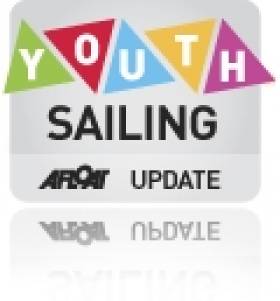Displaying items by tag: Champion Club
Northern Ireland Yacht Club Awarded Volvo RYA Champion Club Status
Carlingford Lough Yacht Club in Northern Ireland has been presented with the prestigious Volvo RYA Champion Club award. Carlingford Lough has been recognised for its very active racing programme focusing on the Laser 4.7, Radial and Topper classes. The club encourages and supports talented young sailors to develop and progress throughout the RYA Youth and Olympic programmes.
The presentation was held at the Yacht club's annual dinner dance and presentation at local Whistledown Hotel, Warrenpoint. Commodore, Michael McCann understands the importance of developing the club's youth sailors "We are all very delighted and proud to have been awarded the coveted Volvo Champion Club status. This achievement is a reflection of the great work, dedication and energy which has been put into youth and junior sailing in recent years.
While a number of senior club members have been involved along the way I must single out our past sailing secretary Dr Henry McLaughlin who worked to fulfil the arduous requirements necessary to gain this recognition. The Club would also like to thank Volvo and the RYANI for this award and we will continue to work with them to promote Championship level sailing in the region."
The club's junior training programme is run by 8 regular volunteers who are committed and dedicated to helping with the racing, training and the club's busy social programme. For the past three years the club has had five juniors in the RYA Volvo national squad and at the 2010 RYA Volvo Zone Home County Championships in Northern Ireland two of the members excelled both finishing in second place.
Carlingford Lough Yacht club is one of only 12 clubs in Northern Ireland and 171 nationwide to be awarded the esteemed Volvo RYA Champion Club status. Richard Honeyford, RYA High Performance Manager for Northern Ireland presented the club with the award "I am delighted to be presenting this award in recognition of the great work that Carlingford Lough Yacht Club has done to help young sailors to develop their racing skills. Following the success of British sailors at the Beijing Olympics, and with the 2012 Olympics fast approaching, we may well be training future Olympians here in Carlingford Lough"
The Volvo RYA Champion Club Programme aims to encourage young sailors and windsurfers at grassroots level to stay in the sport and learn to compete, while encouraging clubs to introduce youngsters to the sport and help develop their skills. The key challenge for the programme is to encourage more young people to start participating in sailing and then progress with their racing careers.
Now Carlingford Lough Yacht club has been awarded the Volvo RYA Champion Club status, the sailors will see increased levels of development advice and professional coaching including support from the RYA. Carlingford Lough will also have access to the recent commitment from Sport England of £1.1m to the RYA's flagship youth sailing initiatives, to further enhance club coach and volunteer development across England over the next three years.





























































